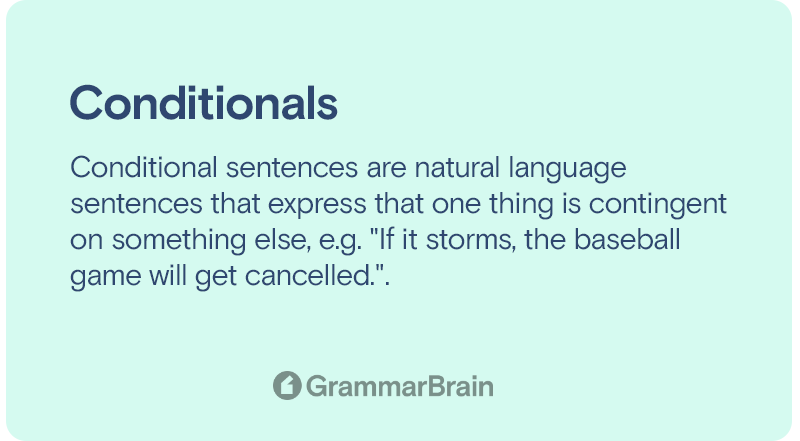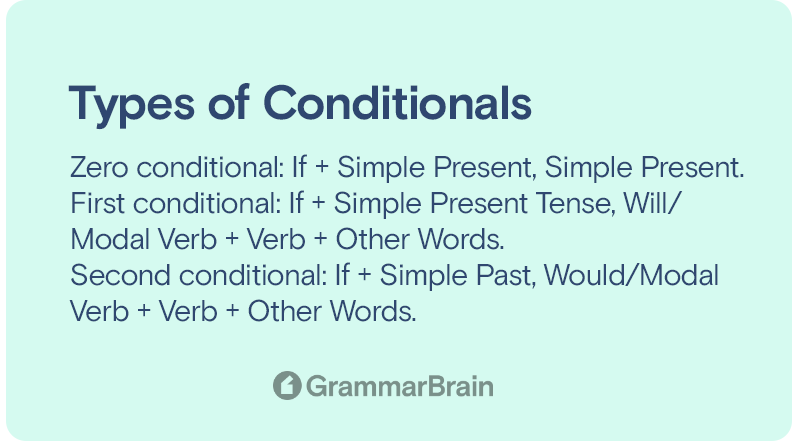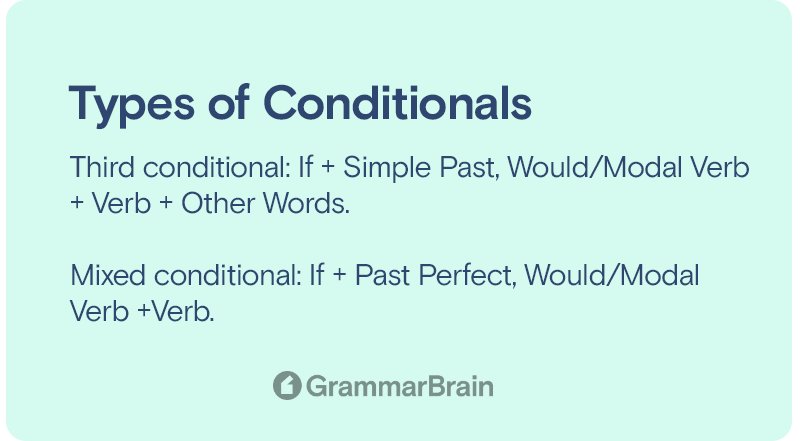What is a first conditional? How does a first conditional work? The first conditional is a conditional phrase in English. It represents the future result or consequence of a possibility that is realistic, either currently, or in the future.

What is the first conditional?
In English, several phrases are used to give meaning to circumstances that occur in life. The conditional phrase is used as an expression to relay information about something that will take place in the future. Nonetheless, in a conditional phrase, the consequence of something occurring is a result of some action that has taken place in the past.
The first conditional is any phrase that represents an action that will happen in the future based on something that has happened in the past. The action is the result of the occurrence of the past, and realistically takes place. Consequently, the resultant action is something that is bound to happen or has a good chance of occurring. Here is an example:
- In case John misses the morning train, he will take the afternoon train.
Here, the sentence expresses a condition stating that “In case” someone misses a train (there is a chance of missing the train), the next will be taken (the afternoon train). As a result, the possibility of missing the first will be resolved by taking the afternoon train. The first conditional sentence represents a reality (a definite possibility, or a certainty) that the next train will be taken.

When to use the first conditional
There is something to note about the first conditional phrase; it is used only when the consequence of any action results in reality. That means, if any incident occurs, the result has to be a realistic possibility. This makes it different from a conditional sentence in which the consequence may not be realistic.
In a sentence with the first conditional, the first part of the sentence is indicative of something that may happen, with the second part representing a certain or definitive consequence.

How to form the first conditional
To form a sentence with the first conditional, the following formula applies:
- If + the present simple tense, won’t/will + the verb
E.g., If I pass my exams, I will celebrate with a party.
If I pass my exams, I won’t have to sit for them again.
As is the case with any conditional phrase, the structure can be inverted:
- Will + the verb if + the present simple
E.g., I will celebrate with a party if I pass my exams.
I won’t have to do my exams again if I pass my exams.
The difference between the first conditional and the second conditional
The first conditional clearly describes events that will happen in the future or are likely to happen, in a realistic way. The second conditional, on the other hand, describes future events that may not happen. Consequently, the second conditional is subjective and is reliant on an opinion or a point of view. Here are examples of each:
- First Conditional: If he marries Rita, he will become rich overnight.
- Second Conditional: If he had met Rita, he would’ve had a chance to be rich.
Examples of sentences in the first conditional
- If it starts to rain, you will get drenched.
- If Tom is late today, I will get angry.
- If the puppy slips, he will have a broken leg.
- Mary will miss the bus if she does not hurry.
- The dress will get soiled if you spill food on it.
- If you don’t take care to get well completely, you will fall ill again.
FAQs
1. What is the first conditional?
The first conditional is a phrase in which an event is described in a part of the phrase and realistic consequences occur in the second part.
2. Is there something as such as the second conditional phrase?
The second conditional phrase describes an occurrence, the consequences of which may be subjective, and not plausible or possible.
3. What are conditional sentences?
Conditional sentences are natural language sentences that express that one thing is contingent on something else, e.g. “If it rains, the baseball game will get cancelled.”
4. Why does the first conditional sound like present simple tense?
Because present simple tense talks about a future possible condition. First conditional sentences often perform the same function. The conditional describes what could happen. The first conditional describes things that are a potential. For example, “I could play tennis if it doesn’t rain.”
Sources:
- The First Conditional (perfect-english-grammar.com)
- The First Conditional – Wall Street English
- Conditional Definition & Meaning – Merriam-Webster
- Conditional – definition of conditional by The Free Dictionary
Inside this article
Fact checked:
Content is rigorously reviewed by a team of qualified and experienced fact checkers. Fact checkers review articles for factual accuracy, relevance, and timeliness. Learn more.
Core lessons
Glossary
- Abstract Noun
- Accusative Case
- Anecdote
- Antonym
- Active Sentence
- Adverb
- Adjective
- Allegory
- Alliteration
- Adjective Clause
- Adjective Phrase
- Ampersand
- Anastrophe
- Adverbial Clause
- Appositive Phrase
- Clause
- Compound Adjective
- Complex Sentence
- Compound Words
- Compound Predicate
- Common Noun
- Comparative Adjective
- Comparative and Superlative
- Compound Noun
- Compound Subject
- Compound Sentence
- Copular Verb
- Collective Noun
- Colloquialism
- Conciseness
- Consonance
- Conditional
- Concrete Noun
- Conjunction
- Conjugation
- Conditional Sentence
- Comma Splice
- Correlative Conjunction
- Coordinating Conjunction
- Coordinate Adjective
- Cumulative Adjective
- Dative Case
- Determiner
- Declarative Sentence
- Declarative Statement
- Direct Object Pronoun
- Direct Object
- Diction
- Diphthong
- Dangling Modifier
- Demonstrative Pronoun
- Demonstrative Adjective
- Direct Characterization
- Definite Article
- Doublespeak
- False Dilemma Fallacy
- Future Perfect Progressive
- Future Simple
- Future Perfect Continuous
- Future Perfect
- First Conditional
- Irregular Adjective
- Irregular Verb
- Imperative Sentence
- Indefinite Article
- Intransitive Verb
- Introductory Phrase
- Indefinite Pronoun
- Indirect Characterization
- Interrogative Sentence
- Intensive Pronoun
- Inanimate Object
- Indefinite Tense
- Infinitive Phrase
- Interjection
- Intensifier
- Infinitive
- Indicative Mood
- Participle
- Parallelism
- Prepositional Phrase
- Past Simple Tense
- Past Continuous Tense
- Past Perfect Tense
- Past Progressive Tense
- Present Simple Tense
- Present Perfect Tense
- Personal Pronoun
- Personification
- Persuasive Writing
- Parallel Structure
- Phrasal Verb
- Predicate Adjective
- Predicate Nominative
- Phonetic Language
- Plural Noun
- Punctuation
- Punctuation Marks
- Preposition
- Preposition of Place
- Parts of Speech
- Possessive Adjective
- Possessive Determiner
- Possessive Case
- Possessive Noun
- Proper Adjective
- Proper Noun
- Present Participle
- Prefix
- Predicate



